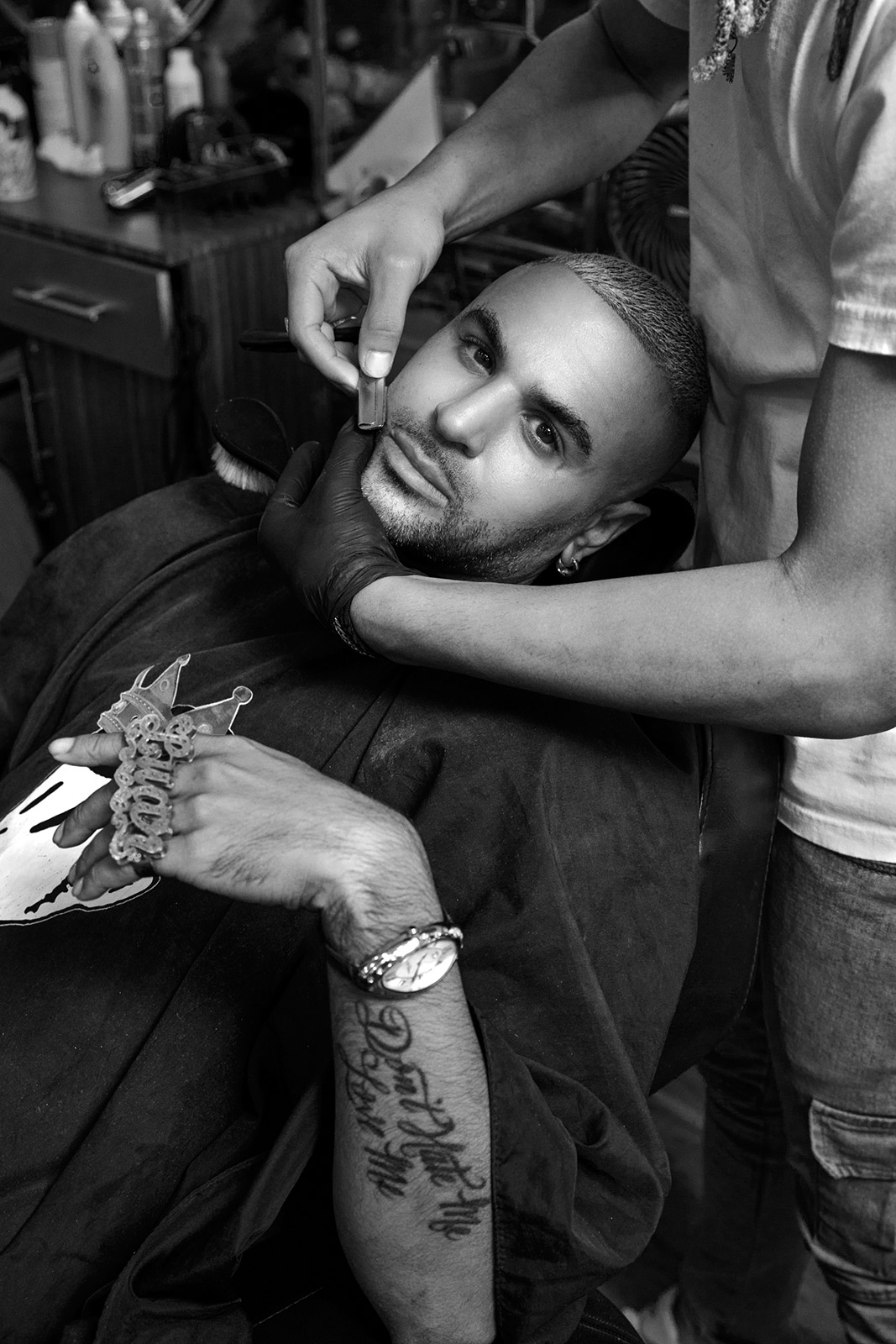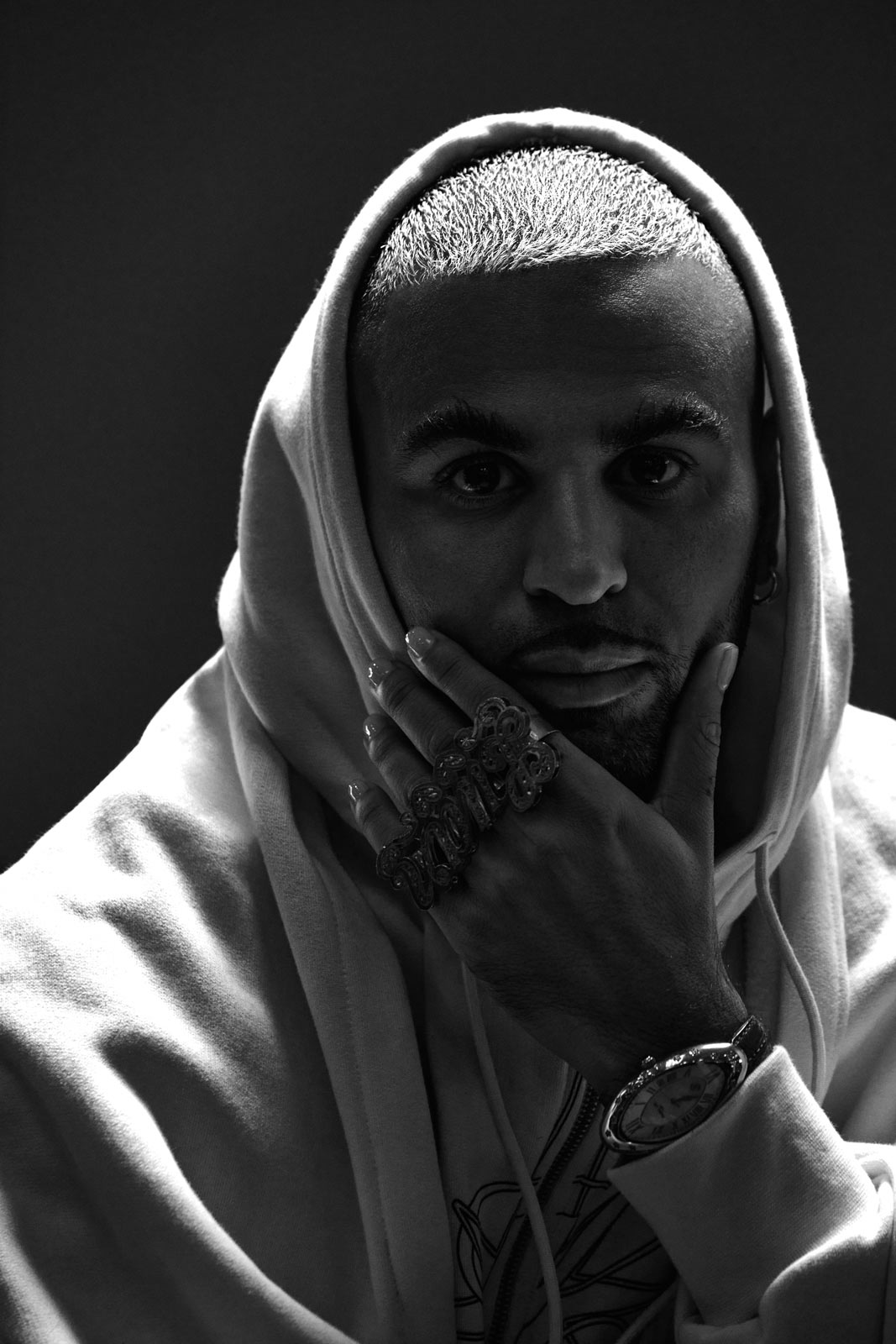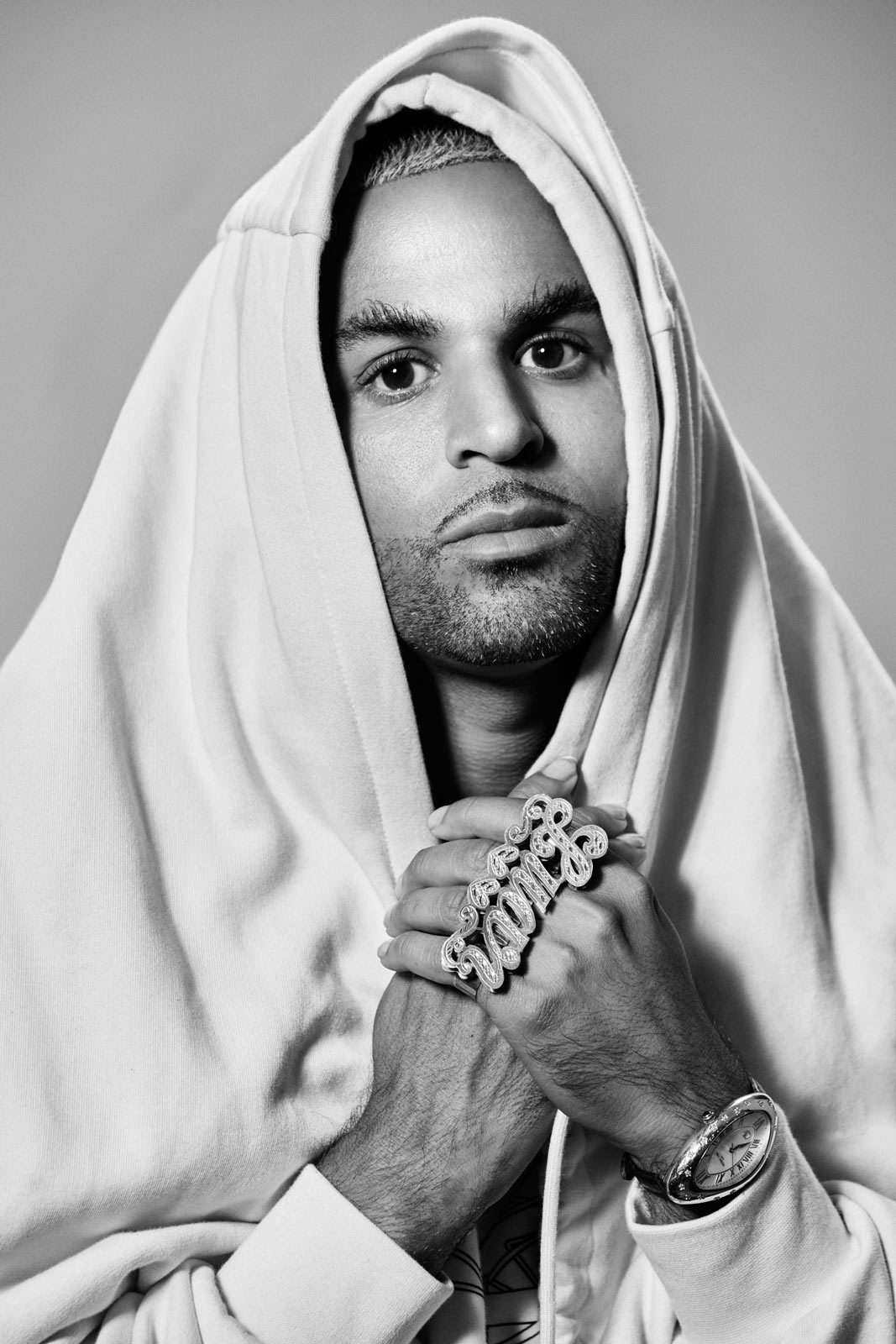
The designer and musician reconnect for Document’s Fall/Winter 2023 issue, talking taste, dreams, island time, and where they’ll go from here
New York is a city of scenes: the beats of the ’50s, the club kids of the ’90s, the indie youths of the 2010s. Today, scene is a dirty word—a descriptor for young creative circles that read more like feuding cafeteria cliques than bazaars of artistic collaboration. Ironically, New York’s newer scenes are laden with those who fancy themselves self-aware, and who are, ironically, blissfully unaware that praising Kerouac and condemning Dimes Square in the same breath isn’t a signifier of intelligence but a hallmark of antagonism. The new cynics can’t struggle to give credit to cultural giants, because they’re intimidated by artists, thinkers, and partygoers of decades past. This new phylum of anti-scene scenesters isn’t falling in step with their could-be compatriots in the arts, instead opting to critique everyone else’s shoe choices.
Raul Lopez doesn’t have time for this. As a notable voice of the city’s fashion community, the designer flips the notion of a namesake brand, literally—Luar is Raul spelled backward. Lopez draws inspiration from the New York of his youth as well as his Dominican descent: shoulder pads become supersized, wife beaters tailored like oxford shirts. These references weren’t so much pillars of fashion as they were tenets of style until Hood By Air, a luxury streetwear brand founded by Lopez and Shayne Oliver, rose to prominence in the high fashion scene. The Luar archetype is less in line with the commercial template of a dreamboat and more with the representation of people from Lopez’s youth. While the fashion world follows wind patterns, Lopez stays grounded in his taste, valiantly navigating the storm with an unwavering kindness. Those who know him-know him call him Granny.
Kelsey Lu is from that camp. The everywhere-based artist, who goes by “Lu,” is first and foremost a musician, armed with a cello and a voice that Lopez endearingly describes as “alluring.” Dubbed “avant-classical,” Lu’s first EP Church made a creative splash in the Brooklyn music scene: They recorded it with a loop pedal before an audience in a Greenpoint church in 2016, immortalizing the live performance. The work Lu has done since—from scoring Janicza Bravo’s Earth Mama, to their performance experiment The Lucid: A Dream Portal for Awakening—cannot be typified. The engine behind it is fueled by their mastery of sound as they converse with space as easily as they occupy it. Lu’s meditative sound baths and live music shows are evidence of this—always working within their environment, never against it.
In part, New York’s reputation for scene-making comes from the notion that it chews and spits out those who can’t hack it—meaning that an artist’s success here isn’t just an emblem of survival, but of being able to thrive in one of the hardest cities in the world. Lopez and Lu exist as vital artisans in today’s cultural moment, because they belong to themselves. There is no need to fight for social worth when their work remains in constant conversation with its surroundings, eternally in service to something larger. Here, the two meet to discuss power, taste, and island time.
Maya Kotomori: How did you end up in the Caymans together?
Raul Lopez: It was fate. Right before things got really bad with the pandemic, my friend was like, ‘Run, it’s about to hit the fan.’ I just started pulling stuff off hangers and throwing it in [my] luggage at 4 a.m, and I ran for my life.
Kelsey Lu: I was visiting because my partner at the time was doing something [at the Palm Heights Hotel]. I was imagining the development of the space, and when I [was offered] a residency there, I ended up staying for a couple of weeks to work on my album. And then I ended up staying longer…
Raul: We thought [the pandemic] was gonna blow over; and then, they started kicking everybody off the island. Lu and I were already at Palm Heights, so we could stay. We were really so privileged to be there.
Lu: I birthed HYDROHARMONIA there—my sound project with the residency. That was a big release for me. I’m working on eventually doing a womb sound installation space where people do a guided meditation. Music has always been a source of healing for me, [through which] I can process my pain. It’s such a powerful feeling that I want to give back to people.
Maya: What does power mean for you both, in terms of personal style?
Raul: It’s creating things that make you feel empowered. I like clothing that sparks conversation. Clothing that gives you the power to walk into spaces where you might have previously been uncomfortable. Clothing that makes you confident.
Lu: For me, the power is in really creating your own [look]. That comes from within. When you’re able to wear something you feel powerful in, you’re bringing yourself into what you wear.
Maya: How do you feel about outfit repeating, or the concept of a uniform?
Lu: I love repeating an outfit, but switching an accessory, or a shoe.
Raul: You’re a shoe addict! I will [also] repeat an outfit and just change the shoe, and maybe the eyewear. I could put on a pair of reading glasses and make [a look] a little more demure. And then if I want to spice it up, I’ll put on a crazy eyeglass—completely different.
Lu: So you’re six days out from your show. Is there a title that you’re able to reveal?
Raul: It’s called Socorro, which means ‘help.’ It’s also my mom’s name. Her real name is Ana but everyone knows her as Socorro—and it’s the name of this song that was playing when I first had the idea for this season. I was [alone] in the car in my friend’s hood in the DR, and that song was blasting out of these speakers in front of a house, with a lot of girls who do sex work. There’s that to the right of me, and this woman is preaching on the left. It was like a church, but outside—people sitting in chairs on the sidewalk while this woman was going off, screaming at the top of her lungs. I had this thought that everyone on both sides of me was looking for help; they were [screaming] for it. Same with the song. He’s yelling socorro, saying [essentially]: ‘I’m with God, but I’m also with your enemy. I’m dying in a sea of hate. Everyone is trying to pull me back when I’m trying to move forward.’ My realization at the end was that everyone’s getting on their knees either to pray, or to service. They’re both looking for help.
Lu: I feel like that goes to show how much you value observation, which is a power of yours that you bring into your designs. Your collections are like the collisions of the worlds around you.
Raul: They work symbiotically. The collision of all these things almost triggers me, that aha moment. This collection is Pentecostal Thot. Luar is right in the middle. I’m very spiritual, and I also like to drop it like it’s hot.
Lu: And there’s room for that. We have the capacity to hold everything. I feel like we often limit ourselves—and a lot of that is out of guilt or shame—but we’ve got to hold forgiveness. Not only for ourselves, but for others. This reminds me of a quote I’ve been clinging to: Rick Rubin said, ‘The work reveals itself as you go.’ I really, truly believe that. I had a dream that we were sitting on a grassy knoll, drinking tea, and talking about life.
Maya: What are some recent dreams you’ve had?
Raul: Oh, I haven’t been having dreams. I’ve been having nightmares. I guess it’s just anxiety… Lu’s the real dreamer.
Lu: I had an interesting dream recently. I wrote parts of it down: I mangled my wolf pup self as an alpha wolf. After my climb to the highest abandoned office building in the decrepit waste of a dusty city at dusk, I call out for my fate in order to carry my pup body on the strength of my wide alpha back, after having mangled my pup self to the edge of death in order to fulfill my mission—getting where I need to go in the most efficient amount of time, knowing that I had to be the one to carry myself there. But why did I beat myself up in order to do so? Why did I feel loving, warm, caring, being submissive, without a fight? That felt necessary.
This past year has been [about] healing, transitioning, and releasing binds, patterns, toxic relationships. And I think I’m recognizing patterns I picked up as a child that no longer belong to me, and [shedding] the things that I don’t need.
Raul: The things that don’t serve you.
Lu: Exactly. I also think I am on a mission, just getting through this year. I know that it’s going to be painful, and I have to go into my shadow side. But it’s worth it.
Maya: I feel like, when you explain a dream, you have to accept that the other person will never really get it, because they don’t make sense without your memories. Is there a specific place your work seeks to inhabit, or create, for others?
Raul: For me, it’s about creating a space where people can belong—a safe haven. I remember going to PAL and the YMCA as a kid, and it was a known thing that, no matter how bad your situation was at home, or in your neighborhood, you changed your tune when you stepped in there. It was a kind of respect. I want that feeling when you come to Luar—this feeling of being confident enough to be comfortable in yourself. This is the world that I’ve been cultivating for a long time, because I was also looking for a place to belong; we had to create those spaces [for ourselves].
Lu: There’s a reason why you’re called Granny.
Raul: I love everybody, and I’m cool with everybody. I like to chat, and I like to make people feel at home.
Maya: How do you feel taste has shifted over your careers?
Lu: I think taste has moved toward craving vulnerability. I think what’s poisoning the well is catering to [other people’s ideas] without any real experience or research.
Raul: We’re fed so much at one time; I feel like a lot of the kids have taste. I just wish there was a bit more research, or imagination, and not so much influence from a feed.
Lu: There’s something about physically researching. I think the demand for things to move so quickly is really [dangerous]. These kids have so much fear of being left behind. Really allowing yourself time to cultivate is so important, to think, What’s actually moving me to like this thing that’s trending, and how can I make it my own? We’re all inspired by something.
Raul: I’ve always said that’s what fashion truly is: taking something [that already] exists and making it your own. I think that’s the key to originality—not just repeating, but adding.
Everyone is always trying to control the narrative, trying to keep up with the pace of life. I’ve never abided by anyone else’s rules, and I think that’s how I’ve cultivated this persona. I never chose to run with the packs. It’s not that serious—trust me. [Taste has] become like high school, where everyone is trying to be down with a clique. But you’re not going to see them later in life. It’s better to build yourself organically, and let destiny do what it has to do.
Photo Assistants Ross Zavoyna, Isaac Schell. On-set Production Jules Wang.












